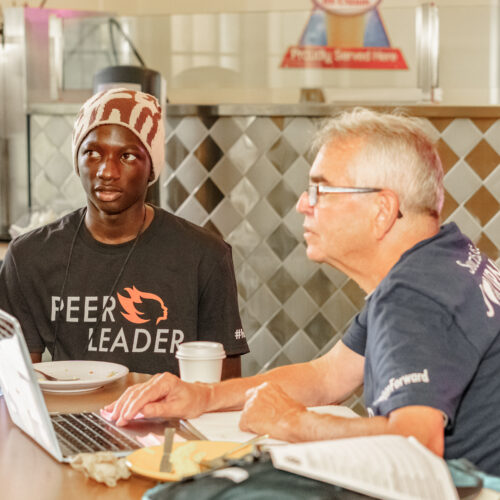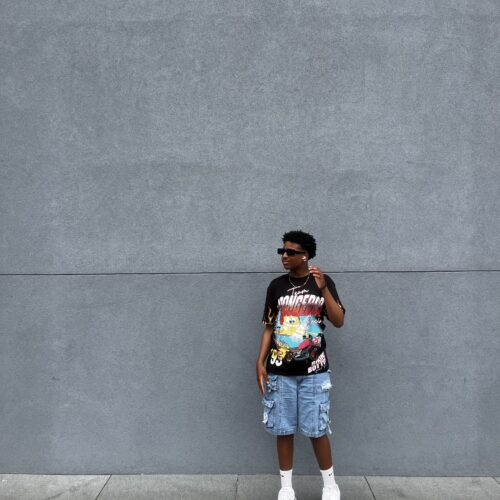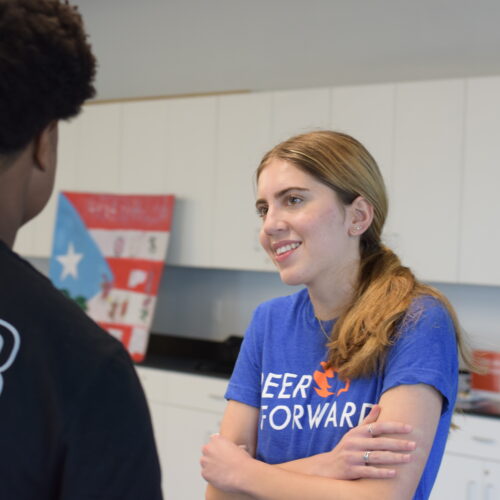This week, we are spotlighting the story of one of our Senior Peer Leaders, Dario Reyes! Dario is a student at Crossland High School in Maryland, where he has made it his mission to support his classmates as they plan for life beyond high school: he reflected, “Something that I will remember from this amazing group is being able to help my peers prepare for the future. Going through so much on my own made me realize that I needed to help others.”
Dario is also getting ready to pursue his own postsecondary goals: “I’m very excited about being independent and finally fulfilling my dreams of achieving higher education, which is something rare in my family.”
Dario was recently admitted to Chatham University in Pittsburgh, PA with an $80,000 scholarship. Below is his successful college application personal statement. Dario worked with a PeerForward writing coach in summer 2021 to craft his story of resilience and leadership.
From living on unpaved roads to living among skyscrapers, from living among a like-minded community to living among people that didn’t look like me nor understood me; it is undeniable that growing up as a minority in the United States, we are bound to face challenges that others don’t. Challenges that can either make or break you. Being born and raised in a different country, I was faced with a harder situation than most may relate to. I say this by having in mind the unspoken rules and codes that sometimes come with being a minority. I believe the ability to adapt and overcome the changes presented by these challenges shapes the person you become and the aspirations you develop in this country.
As an immigrant coming from a smaller and less developed country like Honduras, moving to the United States was a huge change, especially because of how alone it felt in the beginning— for my mom and I had no one but each other. I still remember how it felt at such a young age having to point at something whenever I went to a restaurant for the waiter to understand what I wanted; the burning shame and condescending looks I received. After repeatedly having to experience that, I told myself that learning English was a must, a necessary survival mechanism. I needed to put effort into changing my lifestyle so I could prosper in this new country. It started with TV shows; The Walking Dead and subtitles soon became my best friends. That was the only way that I could read and hear phrases so I could learn what they meant and what they sounded like. I assimilated but without letting go of my roots and recognizing how this path could be less harsh to immigrants. Whenever I think of those days, I reflect on how far I have come and reminisce on the universal experience that every person faces after their arrival to this country.
I constantly relive the memory of my first day of school. It was so disorienting to come into a school where I knew nothing and had no one to rely on for help. It was hard to walk into a cafeteria and see everyone talk to each other, and yet know that I had no option but to sit in a corner by myself. But not because I didn’t want to, but because I just couldn’t understand what everyone would say to me. The only thing I could say was, “My name is Dario.” Anything that came after that was an incomprehensible mix of words. Every day I would write words in the back of my journal, words that I didn’t know. After school was over, I would come home and translate all of those words and practice their pronunciation until I remembered.
Eventually, my English improved. Given my experience and struggle, I gained the ability to relate to other students that, like me, had issues with the language barrier. I became my class’s translator for newcomers. I was the person who would give them a tour of the school and who they would come to if they needed help. The feeling I received from that was nothing I had ever felt before. Experiencing that made me realize who I want to become in the future: working alongside county and state officials and young leaders to make our county a place that includes everyone. I want to be able to provide the resources that I didn’t have and those that I still don’t have when it comes to higher education. Such as mentorship, financial help, and emotional help. Attending college will allow me to get on the route to founding my own non-profit that will focus on immigrants and provide the resources that just make their lives easier.











